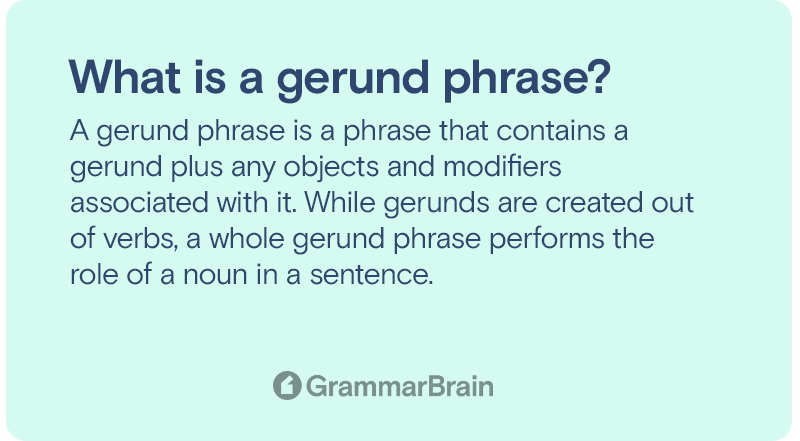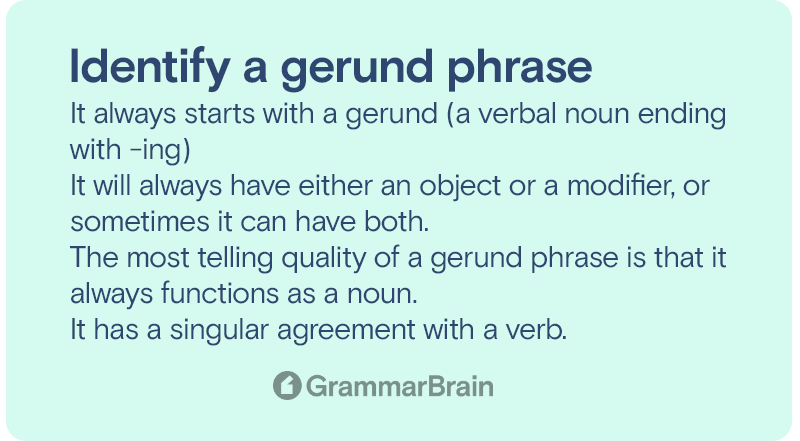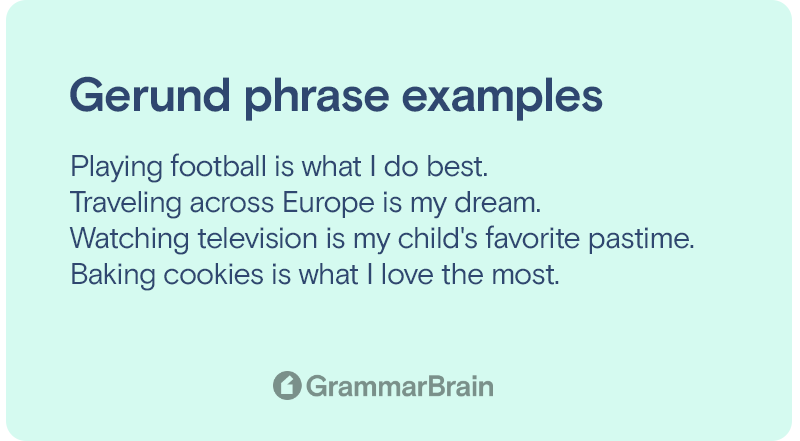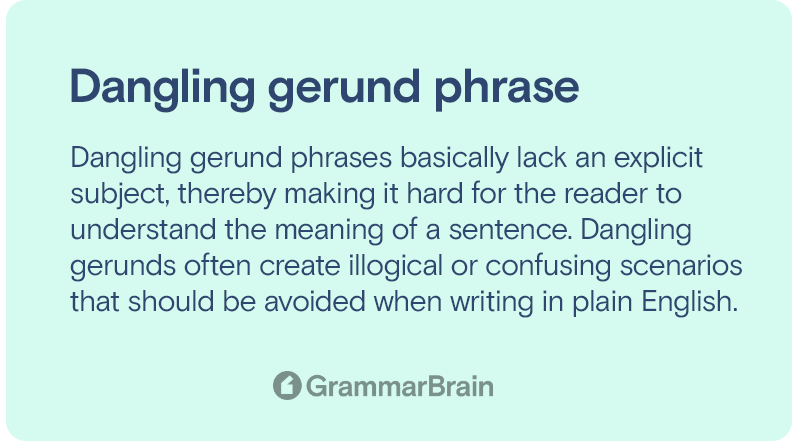Gerunds and gerund phrases are a common part of the English language. When writing in plain English, we often use these words and phrases to enhance our writing. Today, we will learn more about ground and gerund phrases, and how they are used in English with examples.
What is a gerund?
Before learning about gerund phrases, it is important to understand what is a gerund and how it is used in a sentence.
The word “gerund” originates from a Latin word, gerunds, which means “to carry on.” A gerund is a verbal noun ending in -ing. It has the function of a substantive and at the same time shows the verbal features of tense, voice, and capacity to take adverbial qualifiers.”
Consider the following examples:
- Travelling is my passion.
- My friends love my cooking.
In both of these examples, the words that have an -ing at the end are actually verbs acting as nouns. These are known as gerunds. So, it can be said that a gerund is a noun created by adding an – ing at the end of a verb (a verb is a doing word that refers to action). For example, traveling, reading, laughing, etc.

What exactly is a gerund phrase?
Once we understand the definition of a gerund, understanding gerund phrases become simpler.
A gerund phrase is a phrase that contains a gerund plus any objects and modifiers associated with it. While gerunds are created out of verbs, a whole gerund phrase performs the role of a noun in a sentence. Gerund and gerund phrases can act as subjects, objects, or even predicate nominatives in a sentence.
Consider the following sentence, for example:
- My favorite hobby is reading.
The above-mentioned sentence contains a gerund (reading) that is acting as a predicate nominative.
Here is another example:
- My 2-year-old loves running with a ball.
In this sentence, “running with a ball” is a gerund phrase and it is acting as the direct object of the verb “loves.”

How to identify gerund phrases
If a person has just started learning the technicalities of the English language, identifying gerund phrases can be tricky. However, there are several easy rules and signs that one can use to identify gerund phrases.
This section will discuss some common tips that will make it easier for you to identify gerunds and gerund phrases in a sentence or paragraph.
A gerund phrase always follows these rules:
- It always starts with a gerund (a verbal noun ending with -ing)
- It will always have either an object or a modifier, or sometimes it can have both.
- The most telling quality of a gerund phrase is that it always functions as a noun.
- It has a singular agreement with a verb.
A phrase that satisfies all of these four rules will be considered a gerund phrase.
Consider the following examples for more clarity:
- Cooking alone is my hobby.
- My hobby is cooking alone.
- I recommend cooking alone to pass the time.
No matter where the gerund phrase – “cooking alone” appears in the above three sentences, it satisfies all of the four rules.

Which is an example of a gerund phrase?
Here are some easy examples of gerund phrases in a sentence:
Examples of gerund phrases acting as a subject
Gerund phrases acting as a subject:
- Playing football is what I do best.
- Traveling across Europe is my dream.
- Watching television is my child’s favorite pastime.
- Baking cookies is what I love the most.
Examples of gerund phrases acting as a direct object
Gerund phrases acting as a direct object:
- I prefer eating dinner with my family.
- My son enjoys watching television.
- My daughter doesn’t enjoy swimming with her friends.
- I prefer cooking alone.
Examples of gerund phrases acting as an indirect object
Gerund phrases acting as an indirect object:
- The teacher has made writing three essays a requirement to pass the course.
- To improve her health, Sarah made doing Yoga every day her priority.
- You should make scoring high grades your main goal.
- Jess gave winning the marathon his best shot.
Examples of gerund phrases acting as a predicate nominative
Gerund phrases acting as a predicate nominative:
- My favorite hobby is reading thrillers.
- The crew’s top priority was getting the passengers out of the ship.
- My daughter’s favorite pastime is listening to music.
- Many people consider meditating as a form of recreation.

What are dangling gerund phrases?
Along with the normal gerund phrases, we also have something called dangling gerund phrases in English grammar. Dangling gerund phrases are nothing but gerund phrases that don’t clearly indicate the subject of a sentence. They leave a part of the sentence dangling.
Dangling gerund phrases basically lack an explicit subject, thereby making it hard for the reader to understand the meaning of a sentence. Dangling gerunds often create illogical or confusing scenarios that should be avoided when writing in plain English.
Here are some examples of dangling gerund phrases:
- The world can become more peaceful by being kinder to each other.
- Upon entering the dark alley, my heartbeat spiked.
While both of these sentences have a gerund and an object, they lack an explicit subject. We can improve these sentences and make them more clear by adding an explicit subject to the sentences. here’s how:
- By being kinder to each other, we can make the world more peaceful.
- Upon entering the dark alley, I felt my heartbeat spike.
As soon as we add an explicit subject to the sentences, they will become clearer and more logical for the readers. It is recommended to always analyze gerund phrases, ensure that they follow the above-mentioned four rules, and correct all dangling gerund phrases by including an explicit subject.
FAQs
1. What are the five examples of a gerund?
The five examples of a gerund are as follows:
- Miss Wheeler taught me dancing.
- My brother is afraid of swimming.
- My favorite hobby is listening to music.
- You should never be afraid of doing hard work.
- She found her passion in writing.
2. How do you identify a gerund in a sentence?
Identifying a gerund is not incredibly complex. To identify a gerund in a sentence, you must know that a gerund is a verb having an -ing at its end, and it functions as a noun.
For example, consider this sentence: I like reading. Here, reading (a verb that is ending with an -ing) is a gerund.
3. What are the four types of gerunds?
The four types of gerunds include the following:
- Gerund as subjects
- Gerunds as direct objects
- Gerunds as indirect objects
- Gerunds as predicate nominatives
4. What is a gerund phrase?
The gerund phrase consists of of a gerund plus modifier(s), object(s), and/or complement(s). The gerund phrase functions as the object of the preposition. The gerund phrase acting as a complement can be subject complements that follow forms of the verb “to be” or “such as.”
5. How does a gerund phrase start?
A gerund phrase stars with a gerund and then adds other modifiers or objects. Often, a gerund phrase includes a preposition like (at, for, in, etc.)
Sources:
- Merriam-Webster’s Dictionary – Definition
- Ginger – Gerund phrase
- INK Blog – Gerund phrase
- Grammarly – What is a gerund phrase?
Inside this article
Fact checked:
Content is rigorously reviewed by a team of qualified and experienced fact checkers. Fact checkers review articles for factual accuracy, relevance, and timeliness. Learn more.
Core lessons
Glossary
- Abstract Noun
- Accusative Case
- Anecdote
- Antonym
- Active Sentence
- Adverb
- Adjective
- Allegory
- Alliteration
- Adjective Clause
- Adjective Phrase
- Ampersand
- Anastrophe
- Adverbial Clause
- Appositive Phrase
- Clause
- Compound Adjective
- Complex Sentence
- Compound Words
- Compound Predicate
- Common Noun
- Comparative Adjective
- Comparative and Superlative
- Compound Noun
- Compound Subject
- Compound Sentence
- Copular Verb
- Collective Noun
- Colloquialism
- Conciseness
- Consonance
- Conditional
- Concrete Noun
- Conjunction
- Conjugation
- Conditional Sentence
- Comma Splice
- Correlative Conjunction
- Coordinating Conjunction
- Coordinate Adjective
- Cumulative Adjective
- Dative Case
- Determiner
- Declarative Sentence
- Declarative Statement
- Direct Object Pronoun
- Direct Object
- Diction
- Diphthong
- Dangling Modifier
- Demonstrative Pronoun
- Demonstrative Adjective
- Direct Characterization
- Definite Article
- Doublespeak
- False Dilemma Fallacy
- Future Perfect Progressive
- Future Simple
- Future Perfect Continuous
- Future Perfect
- First Conditional
- Irregular Adjective
- Irregular Verb
- Imperative Sentence
- Indefinite Article
- Intransitive Verb
- Introductory Phrase
- Indefinite Pronoun
- Indirect Characterization
- Interrogative Sentence
- Intensive Pronoun
- Inanimate Object
- Indefinite Tense
- Infinitive Phrase
- Interjection
- Intensifier
- Infinitive
- Indicative Mood
- Participle
- Parallelism
- Prepositional Phrase
- Past Simple Tense
- Past Continuous Tense
- Past Perfect Tense
- Past Progressive Tense
- Present Simple Tense
- Present Perfect Tense
- Personal Pronoun
- Personification
- Persuasive Writing
- Parallel Structure
- Phrasal Verb
- Predicate Adjective
- Predicate Nominative
- Phonetic Language
- Plural Noun
- Punctuation
- Punctuation Marks
- Preposition
- Preposition of Place
- Parts of Speech
- Possessive Adjective
- Possessive Determiner
- Possessive Case
- Possessive Noun
- Proper Adjective
- Proper Noun
- Present Participle
- Prefix
- Predicate



